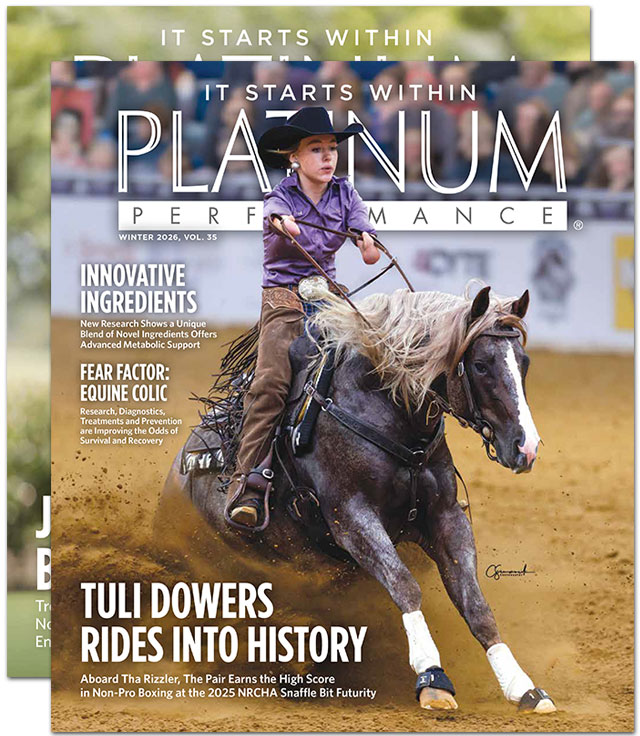Seasonal Support to Keep Your Horse Healthy
in The Heat & During Travel
Summer is here! The longer days full of bright sunshine are perfect for spending the maximum amount of time outside with your horse. Warmer temperatures, humidity and extra trailer time may require special attention to certain areas of equine health: hydration and thermoregulation, allergies and immunity.
Staying Hydrated
8 to 20
Horses will stop to drink water 8 to 20 times each day depending on temperature, humidity and amount of work or exercise.
5 to 10
An average-sized mature horse will drink between 5 to 10 gallons per day at a moderate temperature of 68°F.
1 / Hour
Working horses should be offered water at least once an hour during extended periods of exercise.
3x more
During work in hot, humid environments, a horse will need to increase his water requirement up to three times that of maintenance.
Hydration: Water Balance & Electrolytes
Water is the most important nutrient for all life, and its importance is heightened in the summertime when hot temperatures and increased sweating can cause dehydration quickly. Fresh, clean water should be available at all times. To stay hydrated, horses will stop to drink water 8 to 20 times each day depending on temperature, humidity and amount of work or exercise. How much a horse drinks depends on age, life stage, exercise level and the ambient temperature. An average-sized mature horse will drink between 5 to 10 gallons per day at a moderate temperature of 68°F. As temperatures increase, the amount of water consumed increases significantly. Water consumption will range between 11 to 15 gallons for the same horse at 86°F, and that same horse exercising moderately in 95°F heat will consume 19 to 24 gallons of water. Working horses should be offered water at least once an hour during extended periods of exercise. During work in hot, humid environments, a horse’s water requirement can increase up to three times that of maintenance. Horses being trailered will require breaks for water on trips over two hours in length.
Sweat is the major mechanism for removing excess body heat from the horse. The amount of sweat produced depends on several factors: environmental conditions, type of work or exercise performed, and the horse’s individual fitness level. The summer months are classically when horses will produce the most sweat as temperatures are hotter and horses are more active. Sweat is essentially made up of water and electrolytes. Electrolytes are free, ionized minerals with an electrical charge circulating in a watery solution, such as blood or tissue fluid, and within cells. The main electrolytes needed in the horse’s body include: sodium, potassium, chloride, magnesium and calcium. Phosphorus, zinc, iron, copper and manganese are also electrolytes. Sodium and chloride are the major electrolytes in blood and extracellular fluid, while potassium is the main intracellular electrolyte. All electrolytes are required for a horse’s daily functioning and maintenance, and the horse typically consumes electrolytes from a normal forage-based diet, with the exception of sodium. A typical pasture and/ or hay diet provides plenty of reserves of potassium and chloride to meet the maintenance requirements of most horses, but is nearly always deficient in sodium. For this reason, all horses should always have access to a plain white salt block or loose salt to satisfy sodium requirements.
Hydration and electrolyte replacement is vitally important for alleviating the risk of thermoregulatory dysfunction or health issues associated with dehydration and electrolyte imbalances often seen in hot, humid conditions. Simply providing access to salt and fresh water goes a long way toward ensuring proper hydration. Pasture or hay with free access to white salt blocks or loose salt will fulfill maintenance requirements for the electrolyte needs of most horses throughout the year. However, horses often need supplementary electrolyte support during the hot summer months to maintain a well-hydrated state.
Additional dietary electrolytes become important when horses are sweating more than they would under normal, ambient conditions as the purpose of electrolyte supplementation is to replace what is lost through sweat. Most performance horses or horses training with heavy or prolonged work with significant sweating, especially in hot and humid weather, will require electrolyte supplementation as even mild dehydration can be harmful. Electrolyte deficiencies are associated with general fatigue or muscle weakness and exhaustion that can lead to tying up. Lethargy and reduced feed and water intake can preempt weight loss and dehydration associated with decreased intestinal motility and colic. Inadequate electrolyte levels may reduce sweating, which can cause hyperthermia and compromised performance. Anhidrosis, also called “dry coat syndrome,” is defined as the decreased ability or loss of ability to sweat in response to increased body temperature resulting in several clinical symptoms.
Healthy Hydration Tips
- Provide a plain, white salt block or loose salt at all times. Horses will freely consume 50 grams per day on average of NaCl, satisfying the needs of most horses in moderate work.
- Fresh, clean water should always be available. Electrolyte supplementation will increase water consumption, as will hot, humid weather conditions.
- Supplementary electrolytes may be necessary to replace those minerals lost in sweat from hot temperatures, humidity or heavy work.
Signs of Dehydration
- Pinch Test — the skin on your horse’s neck doesn’t quickly return to its place after pinching.
- Mucous Membranes — the horse’s mucous membranes in the nose and mouth are dry or red.
- Capillary Refill — when you press your finger on the gum, the spot should change from white to red quickly. The longer it takes the capillaries to refill shows the severity of dehydration.
- If you suspect dehydration in your horse, you should call your veterinarian immediately.
Management Tips for Non-Sweaters
Aside from dietary adjustments, there are other management options to support thermoregulation in horses with anhidrosis. Many affected horses have been noted to effectively start sweating again once relocated to a cooler climate. As this may not always be possible, other therapy options may help to keep affected horses comfortable.
- Clean, cool, fresh water should always be available
- Providing shade during turnout or turning out at night
- Fans in the stall are helpful to increase air circulation
- Water misters can help to cool a horse down as well as sponging or hosing off with cool water
- If the horse tolerates exercise, opt to ride during the cooler hours of the day and dampen the coat prior to exercise
- Monitor the horse’s respiration during exercise and allow for ample cool down time
- Full body clipping may also further help to regulate a horse’s core body temperature

Daily Electrolyte Requirements, Grams per Day
| Electrolyte | Maintenance | Light Work | Heavy Work |
|---|---|---|---|
| Sodium (Na) | 10.0 | 13.9 | 25.5 |
| Chloride (Cl) | 40.0 | 46.6 | 66.5 |
| Potassium (K) | 25.0 | 28.5 | 39.0 |
| Calcium (Ca) | 20.0 | 30.0 | 40.0 |
| Magnesium (Mg) | 7.5 | 9.5 | 15.0 |
Allergies: Skin & Respiratory
Spring and summer are the significant times of the year when seasonal allergies flare up. An allergy is an immune disorder characterized by hypersensitivity to specific substances called allergens that result in an excessive inflammatory response. Most commonly, allergic reactions affect the skin in horses, and different types of irritations generally develop in response to exposure to molds, spores, insect bites and certain proteins present in pasture grasses. Environmental allergens pose a major problem in the spring and summer months as pollens and molds are produced rapidly and insect populations are high. Sweet itch or summer itch, technically known as Culicoides hypersensitivity, is a type of chronic and seasonal dermatitis. The skin reacts to the saliva of bites from Culicoides spp., which are known in different parts of the country as midges, biting gnats and no-see-ums. Sweet itch can be especially difficult to control during the hotter months of the year. Careful management of skin allergies, including Sweet itch, is imperative to prevent a horse from harming himself by rubbing itchy, irritated skin. Severe rubbing can cause hair loss of the coat, mane and tail, as well as areas of broken skin and open sores that can then become vulnerable to infection and summer sores. Some shampoos and sprays are effective at repelling biting insects, as well as fly sheets that cover from ears to tail. Cleaning water troughs often disrupts the breeding areas of midges. Stabling horses at dusk and dawn may help to avoid times with high concentrations of biting insects. Fans to circulate and disturb the air are helpful in barns. Steroids are often successful in treating acute skin irritation. Aside from allergies manifesting with skin disorders, respiratory allergies are also common, particularly in susceptible horses. Coughing and increased respiratory rate and effort are symptoms often seen in horses experiencing a respiratory reaction to allergens, especially dust, molds and spores.
Dietary management can be an effective way to provide support for allergies from the inside out for both skin and respiratory allergies. Due to the ubiquitous nature of allergens, feeding a balanced diet is one of the best defenses to fight against allergies. Supplementing with omega-3 fatty acids, trace minerals, vitamins and antioxidants provide nutritional support for seasonal allergies. Fatty acids are constituents of every single cell membrane throughout the body of the horse. Metabolites of the omega-6 fatty acids induce strong inflammatory responses, which have been linked to many chronic disorders. In contrast, omega-3 fatty acids have the capability to maintain a normal inflammatory reaction. Omega-3 fatty acids are also called “essential” fats due to the fact that the horse’s body cannot produce them internally, and so they must be consumed in the diet each day. Flaxseed and flax oil contain nutrients that are precursors to both docosahexaenoic acid (DHA) and eicosapentaenoic acid (EPA). DHA and EPA are long chain omega-3 fatty acids that support allergic responses by promoting both the immune and inflammatory state of the horse.
As evidence of the positive effects of omega-3 fatty acids, one study showed allergic skin reactions to the extract of Culicoides spp., the aggravator of sweet itch, were reduced in horses after 42 days of omega-3 fatty acid supplementation (O’Neill W, McKee S., Clarke A. Can J Vet Res 2002). Other dietary nutrients, such as thymus extract and quercetin, can support allergic response. Thymus extract activates and balances the immune system. It promotes the maturation and activity of specific immune cells that help promote allergic responses. Quercetin is widely used for its antioxidant and antihistamine properties. Quercetin is a natural antihistamine that maintains healthy levels of key enzymes involved in inflammation.
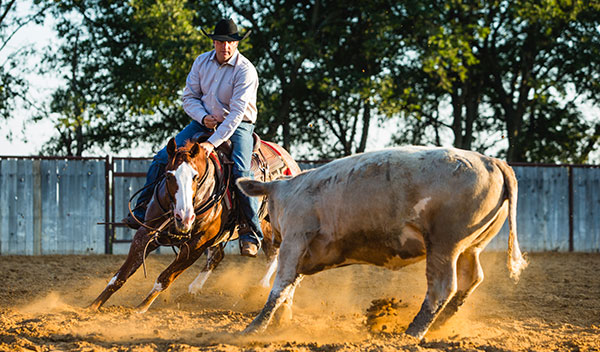
PHOTO BY DREW STOECKLEIN

PHOTO BY ELIZABETH HAY PHOTOGRAPHY
Dietary management can be an effective way to both prevent and also alleviate allergies from the inside out for both skin and respiratory allergies.
Immune Support: Stress, Travel & Exposure
Summer is often the best time to load horses in the trailer and meet friends for an out-of-town ride or head to a competition. A properly-functioning immune system is critical for the health and well-being of all horses and necessary for travel and exposure to new animals and environments. Immunity is the protection against invading microorganisms. The immune system is continuously being challenged without resulting in overt signs. However, if an attack is severe enough or the horse’s natural defense system is compromised, infection and disease can develop. The horse’s immune system responds appropriately to potential microbial pathogens when the levels of systemic inflammation and oxidative stress are low. Because of this, the best and most simple practice is to keep the horse “prepared” at all times by feeding a balanced diet that includes adequate energy to support a healthy weight for the activity level and provides essential nutrients, such as antioxidants, omega-3 fatty acids and certain amino acids. Selenium and vitamins C and E are all nutrients that extend multi-functional antioxidant and immune support. Selenium has immune-supporting benefits, and an insufficient selenium status is linked to an increased risk of viral infection and may impair white blood cell cytokine production. Vitamin E is a potent antioxidant that, with selenium, promotes cellular immunity. Supplementation with vitamin C has shown to support certain white blood cell numbers and activity necessary for a thriving immune system. Omega-3 fatty acids are critical ingredients as they support healthy levels of inflammation systemically and support immune responses. Amino acids are most commonly thought of for their role as the building blocks of protein, but certain “functional amino acids” including arginine, glutamine, cysteine, methionine and phenylalanine maintain immune processes such as cell-mediated immune responses and energy for rapid cellular turnover, such as in the intestine and immune system. Ensuring that these important nutrients are provided in adequate levels in the diet can bolster the horse’s immune system and make them more capable of handling stressful situations, such as long trailer hauls, competition and intense exercise.
Inevitably, times of excessive stress will occur that the immune system is not equipped to appropriately respond to, whether due to surgery, injury or infectious outbreaks. Therapeutic nutritional support can provide both passive and active immune support for horses that are experiencing sickness, are exposed to another horse that is ill or are for any reason dealing with a compromised immune system. During these situations, additional immunonutrients, such as bovine colostrum, can provide support for the horse’s health. Bovine colostrum provides a host of benefits for immunity by providing immunoglobulins to help support the body's defenses against pathogens and maintain normal cell growth and repair. For horses that may be at risk for viral exposure, higher levels of the important immune-supporting nutrients zinc and lysine is advised. Zinc has long been known for providing immune benefits and is required for the synthesis and activity of the powerful antioxidant enzyme, superoxide dismutase. A deficiency of this essential mineral is correlated with immune dysfunction as it is a component in a wide variety of cellular functions. Lysine is recognized as an anti-viral nutrient. It stimulates arginase, the enzyme that breaks down arginine, which is required for the replication of certain viruses. Supplementation with zinc and lysine can prevent deficiencies of these two essential nutrients and may be helpful to support the immune system function if faced with exposure to viral infections.
A balanced diet can go a long way in keeping your horse healthy during the hotter months. For summer-specific issues, supplementary nutritional support is available to aid in normal hydration and sweating, allergy support and a healthy immune system that allows your horse to thrive and fully enjoy the best months of the year.

Summer Support: Platinum Protocols
Support Hydration & Thermoregulation
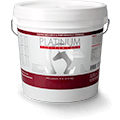 |
Platinum Performance® Equine |
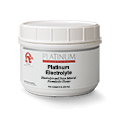 |
Platinum Electrolyte |
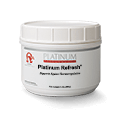 |
Platinum Refresh® |
Support for Allergies
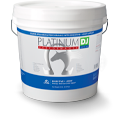 |
Platinum Performance®DJ |
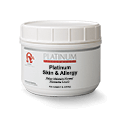 |
Platinum Skin & Allergy |
Support Healthy Immune Function
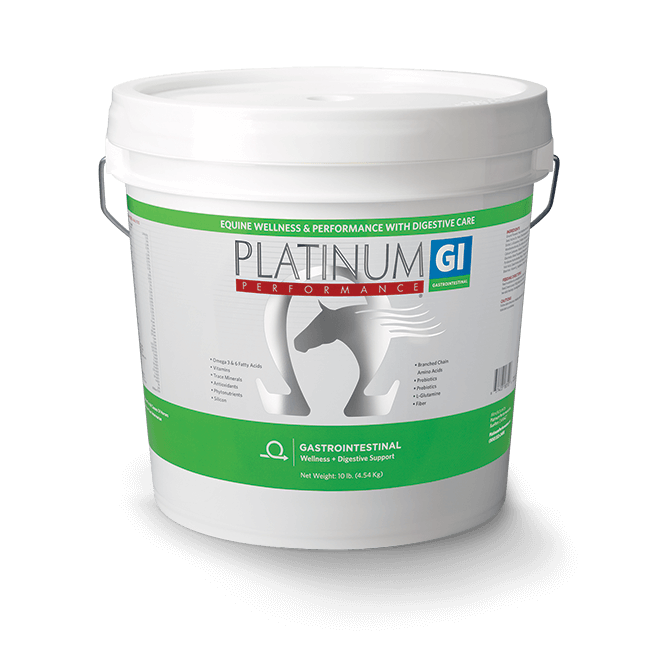 |
Platinum Performance® GI |
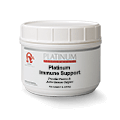 |
Platinum Immune Support |
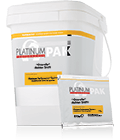 |
Platinum Performance® Equine* + Additional Zinc and Lysine |
*Platinum Performance® Equine, Platinum Performance® GI, Platinum Performance® DJ or Platinum Performance® CJ are each appropriate choices.
For summer-specific issues, supplementary nutritional support is available to aid in normal hydration and sweating, allergy support and a healthy immune system that allows your horse to thrive and fully enjoy the best months of the year.

by Emily Smith, MS,
Platinum Performance®

